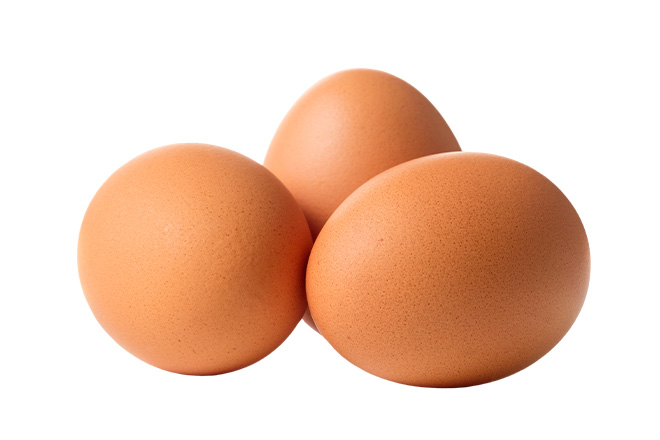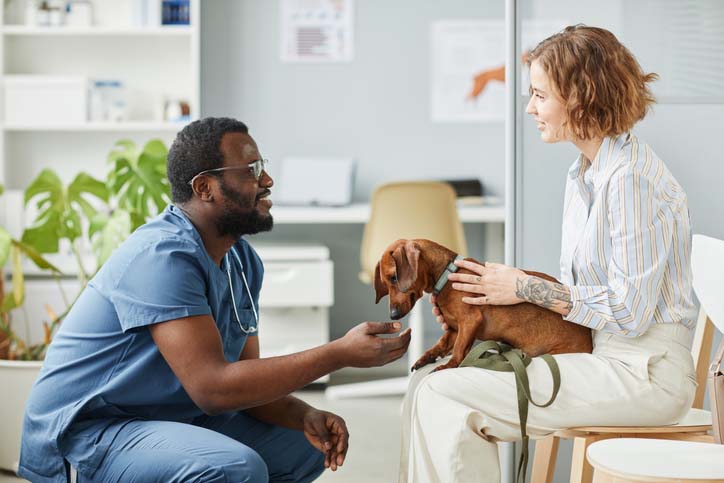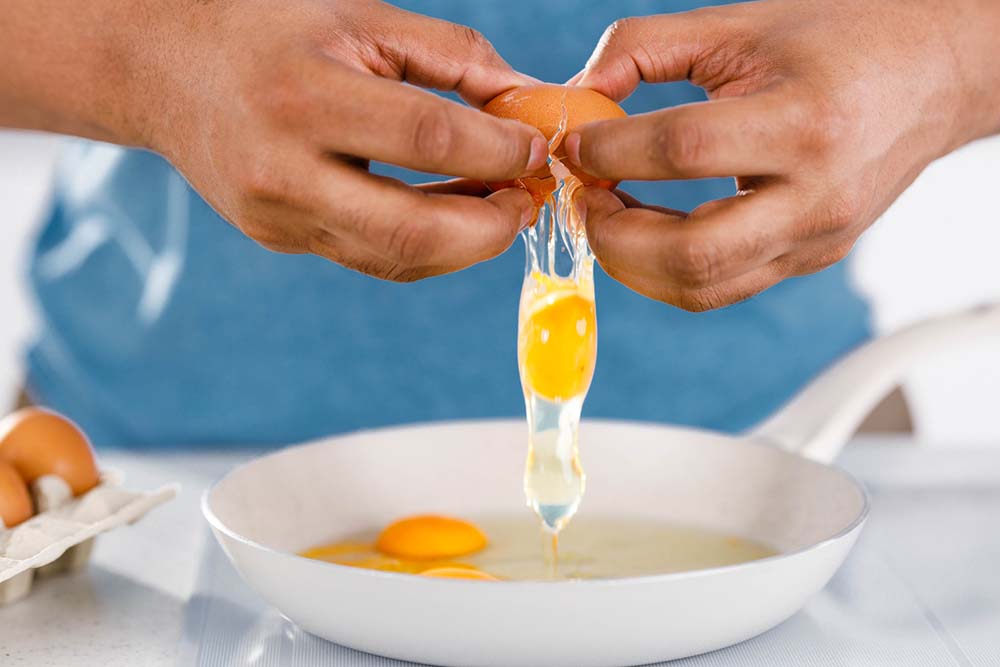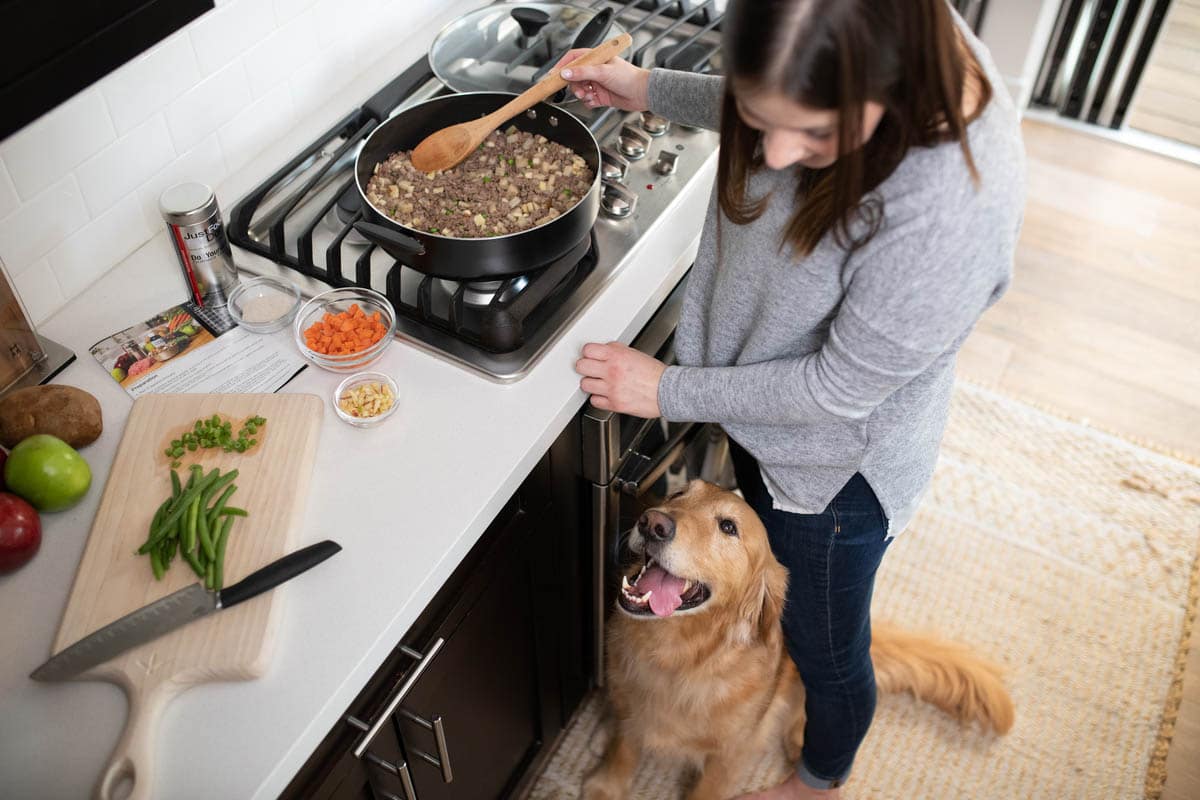All About the Cracked Raw Egg Over Dog Food Trend
Some pet parents provide a cracked raw egg over dog food for their pup, but is it safe? Here's what vets have to say.
Have you seen pet parents provide a cracked raw egg over dog food for their pup on the internet lately? It’s an interesting trend, but is it safe?
The assumption is that a whole egg is a great addition to a balanced diet, because of the essential amino acids for protein production it provides. They hear that it’s good for coat health because of the essential fatty acids in eggs.
But are raw eggs something your dog needs in his diet, and do they provide more health benefits and nutritional benefits than the risks they may pose? Let’s break it down.
Are Eggs for Dogs a Good Idea?

Can dogs eat eggs? Are eggs good for dogs? Eggs can be good protein sources, particularly egg yolks, and they do contain helpful fatty acids, like omega-3, folic acid, and other vitamins and minerals that give them a high nutritional value. As long as they are consumed in a safe manner and under the guidance of a veterinarian, they can make for a great snack.
Fresh eggs, therefore, can be a high-quality source of many nutritional ingredients that help your pooch build and maintain a healthy immune system, keep his digestive system running smoothly, and potentially avoid certain nutritional deficiencies.
Moreover, for picky eaters, eggs can be used as a topper to get them to eat their regular food, which is a step in the right direction.
But should pet owners be feeding their dogs a raw egg every day? Do raw eggs pose some of the same risks as raw meat? Does a healthy dog necessarily need a raw egg to prevent health problems?
These are all good questions, so let’s take a look at the facts.
What are the Health Benefits of Eggs?
Eggs contain the following vitamins and minerals that are good for your dog’s health:
- Iron
- Riboflavin
- Fatty acids, like omega-3
- Folate
- 18 of the 20 essential amino acids needed for protein production
- Phosphorus
- MagnesiumAdd
- Selenium
- Vitamin A
- Vitamin B, including B12
These nutrients are part of a healthy diet for your dog, but aren’t they present in commercial dog foods? The answer to that is maybe, depending on the brand and quality of dog food.
Additionally, the way that some commercial dog foods are produced, particularly brands of kibble, can affect the nutritional value of the food. For example, extrusion is the process that pet food manufacturers use to make kibble.
One study out of The Netherlands showed that the drying process of extrusion can significantly reduce the nutritional value of the resulting kibble. Thus, dietary supplementation may be necessary to give your dog all the nutrients he needs if he is only eating kibble.
What are the Risks of Feeding Raw Eggs?

There are some risks associated with feeding a cracked raw egg over dog food. Most veterinarians recommend dog owners cook eggs before feeding them to your best buddy. Here are a few of the risks to think about:
Risk of Salmonella Infection
It’s possible for dogs who eat raw eggs to be exposed to salmonella bacteria. This is also true for other raw foods. Additionally, your dog is not the only one at risk as owners who feed raw eggs can be exposed too.
If your dog does get exposed to salmonella bacteria, it’s possible they could contract salmonellosis. The symptoms of such an infection include vomiting, diarrhea, fever, and lethargy. These symptoms can become serious health threats if untreated as they can quickly lead to dehydration and metabolic acidosis or alkalosis.
Biotin Deficiency
Another risk associated with feeding raw eggs is that of a biotin deficiency. Egg whites contain an enzyme called avidin, which prevents the absorption of biotin in the body.
Biotin is a vitamin that helps support healthy skin, digestion, cells, and metabolism. While biotin deficiencies are rare in dogs, they can happen, particularly if you’re feeding too much of a substance that contains avidin.
Other Bacterial Infections
As eggs go bad, they often grow other types of bacteria that can cause infections in dogs. While you wouldn’t intentionally feed a bad egg to your dog, it can sometimes be difficult to tell when it is in the early stages.
What Should You Do If You Want to Feed Raw Eggs?

If, despite the risks, you decide that you still want to feed raw eggs to your dog, there are a few things you should do. The first thing is to talk to your veterinarian to ensure it’s a good idea for your dog. Some dogs may have medical conditions that would be worsened by feeding raw eggs.
Dogs may suffer from problems like obesity and high cholesterol, for example. For these dogs, it’s better to stick to a diet that doesn’t include a lot of extras like raw eggs. Eggs should not be your dog’s main meal, only a supplement or perhaps as a means to settle an upset stomach. Again, you must talk to a veterinary professional about this.
Next, watch out for any signs of an egg allergy. Since it is possible for dogs to have an allergic reaction to eggs, you’ll want to watch him carefully after giving him an egg.
Symptoms of an allergic reaction to eggs include:
- sneezing
- swelling
- hives
- difficulty breathing
- lethargy
- coughing
Additionally, it’s important to consider the source of the eggs you’ll feed. Eggs are, after all, only as good as the chicken that lays them. It’s best to feed your dog eggs that come from free-range farm hens that are fed an organic diet. The healthier the chicken that lays the eggs, the more nutritious they may be for your dog.
Additionally, if your dog eats raw eggs, you’ll want to monitor him afterward for any symptoms of problems like salmonellosis. Make sure to let your vet know you’re feeding raw eggs when you go in for a check-up too, so they can make sure no problems are developing as a result.
What About Eggshells? Can Dogs Eat Eggshells?
Eggshells are a good source of calcium for dogs and can be a good supplement for some dogs. At least one study has shown that eggshell membranes may help to reduce joint pain. But, as with raw eggs, there are some things to keep in mind before feeding them to your dog, including the fact that they can contain salmonella.
As always, talk to your vet first. Then, you might find your dog isn’t as enthusiastic about eggshells since they have sharp edges that can hurt his throat or even his internal organs. Moreover, they apparently don’t taste that great, so your dog might need some encouragement by mixing them with other foods to improve the taste.
As with anything else, be sure to watch your dog carefully after he’s eaten the eggshells to ensure that he doesn’t have an allergic reaction or any other problems as a result.
What Is the Best Way to Feed Your Dog Eggs?
Most veterinarians recommend cooking eggs before feeding them to dogs. They can be boiled eggs or cooked plain without adding any oil, butter, seasoning spices, or salt. Don’t include those or other additives since some of these can be harmful to dogs.
Like humans, your dog may like his eggs scrambled, sunny side up, or hard-boiled eggs. However you cook them, just be sure they are fully cooked. You can integrate them into your dog’s diet as you would any new food — a little bit at a time and in moderation.
You might, for example, start with an occasional bite and lead up to sprinkling scrambled eggs on his regular food. Of course, start with just one, and be sure to watch for any signs of allergy or digestive problems.
As long as you don’t see anything like that, you can keep going. If you do elect to risk it and feed eggs to your dog raw, first consult a vet and be sure to watch out for problems like bacterial infection. If you see any symptoms of that kind of problem, contact your veterinarian immediately.
This content is for informational use only and does not replace professional nutrition and/or medical advice, diagnosis, or treatment. It is not a substitute for and should not be relied upon for specific nutrition and/or medical recommendations. Please talk with your veterinarian about any questions or concerns.








